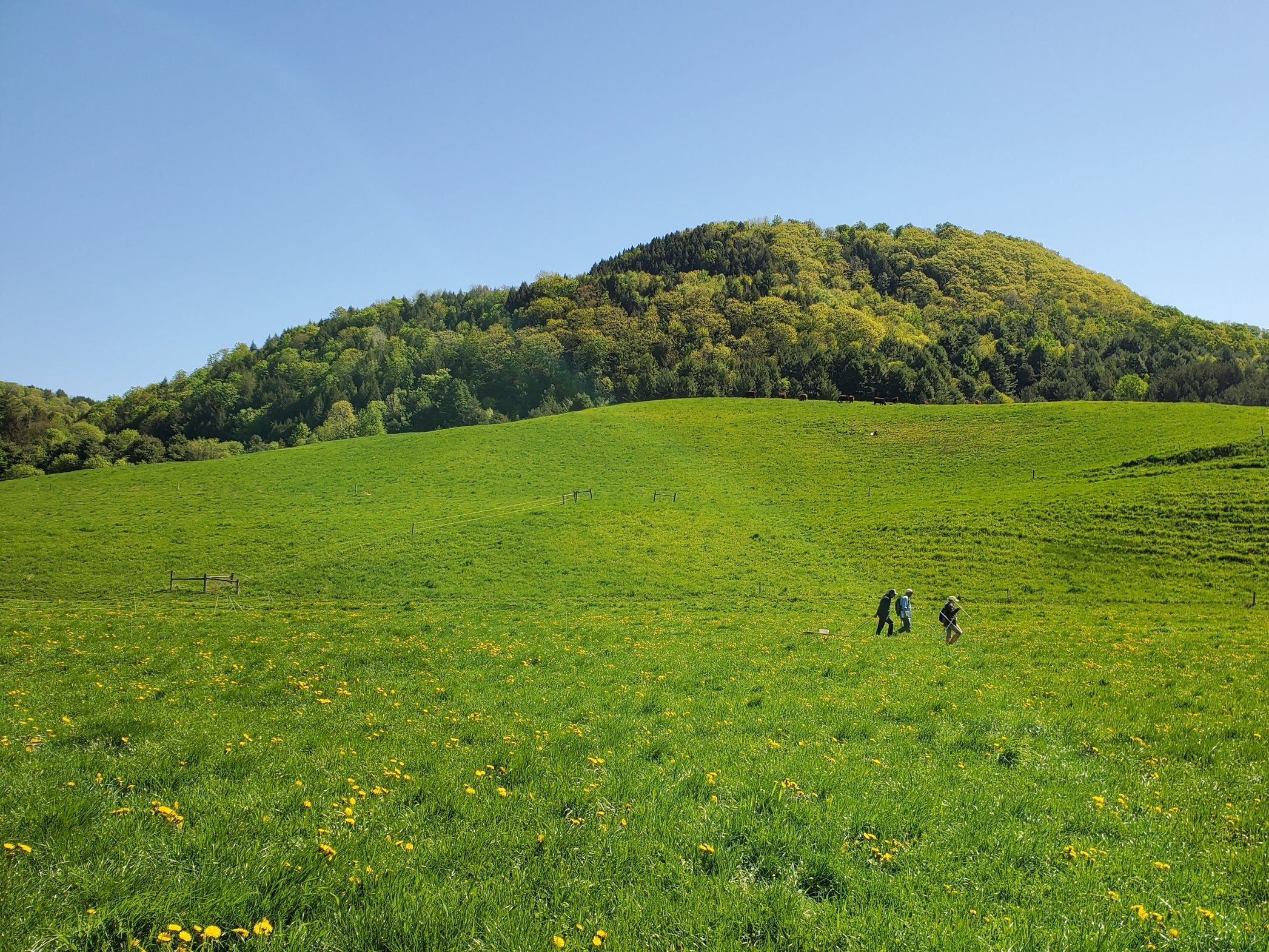On Trust, Belonging, and Time
or My Current Stack of Books
By Meriwether Hardie
I love to ask what books people are reading and what they are learning. I almost always come away from these conversation with new ideas and exciting book titles. It also means that I have books piled on tables all around my house. A friend was recently staying with me and asked why I have so many stacks of books (while also having empty space on my bookshelves). I smiled and after a moment of reflection, I responded that the stacks of books are ones that are waiting to be read or reread. I often put a book down for a couple days or weeks, and then I come back to it. Sometimes I reread a book several times before I am ready to put it away on a bookshelf. Once a book is resting on a shelf, it means that for now, I feel ready to put it away.
In a phone conversation later that day, I shared this story with my mom, and she pointed out that even before I could read, I stacked books in piles. It was my way of asking someone to read them to me. And if enough time passed and no one helped me with my stack, I’d flip through them myself, making up words and stories as I went along. Stacks of books, she reminded me, is a lifelong pattern of mine.
Below are some of the key book topics that are currently scattered around my home. These themes are ones that show up in all of our lives again and again, and these particular books are ones that right now are providing me with important insight into my work. I’ve read them (at least twice) and they are still out on my tables, not yet ready to be put away, as they hold lessons that I am still receiving.
On Trust
The Thin Book of Trust; An Essential Primer for Building Trust at Work by Charles Feltman
Current location in my home: on my kitchen table, resting on top of another book on trust entitled The SPEED of Trust: The One Thing That Changes Everything, which I have not yet read.
Trust is an essential foundation for any healthy relationship, and as Brené Brown writes in her book Dare to Lead, “Trust is earned in the small moments.”
Recently, I have had several people turn to me and share that they do not trust someone who they are in close proximity with. When I tried to ask about the root cause of this lack of trust, I found that neither of us had the language to explore it together and that the person I was in conversation with would inevitably grow frustrated with my inarticulate questioning and say, “I don’t know, it’s just this feeling. I just don’t trust them.”
These conversations left me thinking about trust and how we define it, how we build it, how we talk about it, and how we rebuild it when it is broken. When trust is present, it feels really good—both nurturing and grounding. But when trust isn’t present, it often feels hard to talk about and even harder to understand its absence. From these recent conversations, I have been seeking ways that other leaders talk about trust.
The Thin Book of Trust is a quick and simple read that offers helpful frameworks to support trust building as a workplace competency. Feltman defines trust as “choosing to risk making something you value vulnerable to another person’s action,” which could be a belief you hold, an identity you have, a particular goal, money, a job.
Feltman breaks trust into a framework with four distinct domains— care, sincerity, reliability, and competence— and provides examples to understand each domain. Assessing trust in these different categories “is an antidote to the tendency to engage in confirmation bias.” We can more easily step back and ask ourselves whether the other person might be trust worthy in some ways and not others. It also allows us to also understand where trust does not exist and how to repair it.
On Belonging & Creating Space
The Heart of Leadership, Part 1 & Part 2 from the Dare to Lead Podcast with Aiko Bethea and Ruchika Tulshyan
Current location in my home: downloaded on my phone and shared via text with several friends.
I try to never accept just one answer or follow just one teacher or mentor. After reading the above book, I continued to seek additional resources about building trust in the workplace and I came across this two-part series.
Near the end of Part 1 of the podcast, Bethea brings a fifth key domain into the framework used above— power— meaning both power over and power with. As she articulates, trust is also about the systems in place and who feels safe to be vulnerable and give feedback in a certain space and who doesn’t. Power can be held by title, by who makes decision, by company systems or by processes in place (both historical as well as current).
I highly recommend listening to this conversation (and all of the additional articles written by the Bethea and Tulshyan that are listed on the podcast website), which digs into what it means to belong within a work team and a culture, and how to create space and belonging within that culture.
On Time
Four Thousand Weeks: Time Management for Mortals by Oliver Burkeman
Current location in my home: on my bedside table
In thinking about the above two topics (and their importance, and the time and space needed to focus on that work), my mind naturally goes to, how do I create more space in my day to do the work that I want to do?
Asking that question brought me to Oliver Burkeman, who believes there is no such thing as work-life balance (when I read that for the first time, I both felt my head explode in confusion and an immediate sigh of relief). Burkeman’s philosophy throughout this book is that the sooner we acknowledge that 1) time is finite; 2) that tough choices are inevitable; and 3) that we won’t have time for all that we dreamed we would do in this lifetime; the more productive, meaningful and joyful life becomes.
I often fall into what Burkeman calls “the future chasing mindset” where I subconsciously work with an ethos around “when I get my inbox under control, then I can finally…” He explains that by focusing exclusively on where you are headed at the expense of where you are results in the present moment never feeling fully satisfying.
Although simple in concept, reading these words really resonated with me. Although I bring this lens to my personal life, I had not brought this lens into my work life in thinking through how I structure my day, my week and my time.
“Nobody in the history of humanity has ever achieved ‘work-life balance,’ whatever that might be.”
Throughout the book Burkeman offers history lessons and Buddhism-inspired teachings around our relationship to time. He argues that our complicated relationship to time started when we shifted our understanding of time as simply “the stuff life was made of,” as it was understood in the medieval era, to a resource to be used, which then led us to feel all kinds of pressure about if we were using it well.
I like asking leaders of organizations and teams, how do you structure your to-do lists? Although I use different types of apps and spreadsheets, I still prefer doing a hand written to-do list at the end of the day which involves writing down everything that comes to mind in a somewhat chaotic and brain dump way. I then close my computer. At the start of the next day, I sit down with my list from the night before and reorganize it, focusing on what needs to get done, where the priorities are, how the different tasks are related.
Reading this book changed my process. Now, when I organize myself in the morning, I bring a couple new lenses and perspectives to how I review my to-dos:
I write down the three most strategic things that I want to achieve that day (being realistic around what is possible)
I ask myself, does this choice diminish me or enlarge me? (Burkeman encourages us to choose uncomfortable enlargement over comfortable diminishment whenever we can)
I decide in advance where to fail that day (which to-dos am I going to neglect today or this week?)
Leadership is a skill (not a function) and every day I work to learn and evolve. I receive lessons from my team, from our projects and from the landscapes that we worth with. In asking my contacts what they are reading, I also receive lessons from people across the globe who are asking similar questions as I am, and who approach those questions from different experiences, different backgrounds and different lenses.
Trust, belonging, and time are topics that are central to any human relationship and connection, and are the foundational roots for any team, and thus they will continue to hold places in my book stacks, for many years to come.
A couple of the stacks of books around Meriwether's home...












